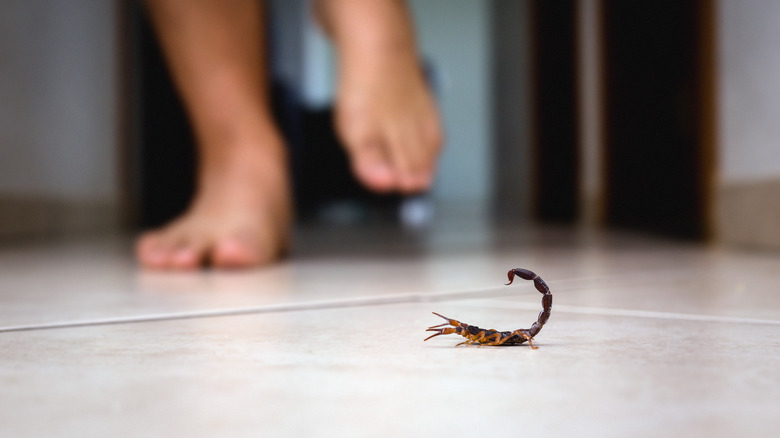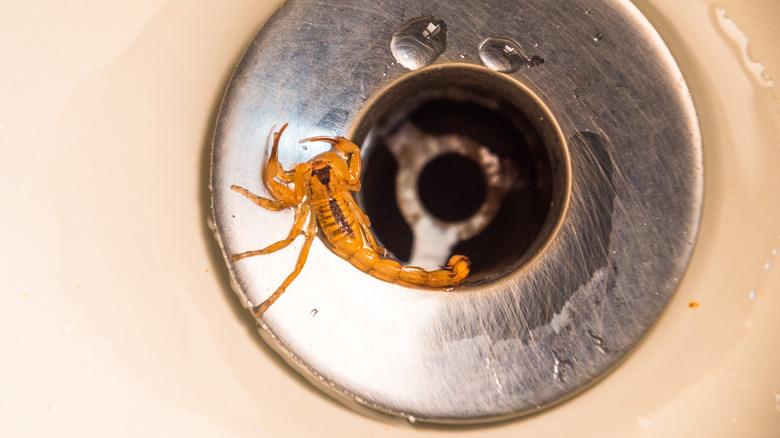Why It's Crucial To Keep Your Home Clutter-Free If You Live In A Scorpion State
You're sweeping lint out from under the washing machine. Something much bigger and more solid than a dust bunny is pulled out with your next sweep. You bend down to take a closer look and, surprise! There's a toxic tail-wielding scorpion staring back at you. If you live west of the Mississippi River (or even in some sections of the East), this scenario could easily be an all-too-awful reality. Keeping your home clutter-free deprives scorpions of the places they love most: small, dark holes and crevices near food (other insects) and water.
Scorpions are nocturnal, coming out at night to hunt everything from spiders to snakes. Their prey depends on their size, which in North America ranges anywhere from 2 inches (bark scorpions) to 6 inches (black hairy scorpions). To escape the heat of the day, they hide in burrows or under natural features like fallen logs, rocks, cliff-face crevices, and caves. Most species of scorpions are highly specialized to localized microhabitats.
Given this, you might think that scorpions are just a problem for those living in rural areas. And it's true that only a few species find their way into American homes and other buildings — the Arizona bark scorpion, the striped-tail scorpion of Southern California, Texas' striped bark scorpion, and the introduced Florida bark scorpion among them. Even the northern scorpion of Montana may enter homes in cold fall weather to seek warmth.
Where scorpions hide
American homes are filled with tasty treats for hungry scorpions (think cockroaches, silverfish, spiders, and crickets), and that, along with water and shelter, is one of the main reasons these admittedly scary-looking creatures decide to take up residence. They gravitate to moisture-laden rooms like kitchens, bathrooms, and laundries. They also love to inhabit closets and drawers, nestle into cracks in woodwork, and get between the baseboard and the wall. House plants, shoes, laundry piles, damp kitchen cloths, and bed sheets are also a favorite hiding spot.
So yes, scorpions can find their way into your house. But do they present any danger to you or your family? While most scorpions are venomous and can (and do) sting when pressed, their stings are rarely fatal. The pain, usually lasting a few hours to days, can be treated by cleaning and cooling the area and taking over-the-counter pain medication. Experts consider just one North American species dangerous — the bark scorpion (Centruroides exilicauda) (via University of California IPM). In rare cases, a person can become allergic to scorpion venom, developing severe symptoms that require hospitalization.
How to de-clutter for scorpions
To reduce the risk, you need to regularly de-clutter the indoor places scorpions favor. We're not talking about "Tidying Up With Marie Kondo" here. Instead, you need to focus on identifying and clearing out spots where scorpions are likely to congregate. Scorpions get inside via loose door seals, unscreened windows, and holes where plumbing meets the walls and floor. Check those features and fixtures for gaps and re-seal them as needed. Clear away any dead trees, leave piles, garden mulch, and household junk from the perimeter of your home.
If your home is especially susceptible to scorpions, shake out clothes, blankets, and wet towels that have been sitting untouched for any length of time (or put them away immediately), check inside your shoes before putting them on, and keep beds, especially baby cribs, away from the wall. Ensure all storage containers have secure lids — avoid small containers that don't close, especially in wet rooms, as they're potentially attractive scorpion hideaways. Wizzie Brown from Texas AgriLife Extension Service suggests waiting until nightfall and using a black light to check the cracks and crevices in your home for scorpions. "Most scorpions will become fluorescent under the black light because of the proteins they carry," she tells the Beaumont Enterprise. What if you find a glowing arachnid? Hiring professional pest control is a sensible next step.


